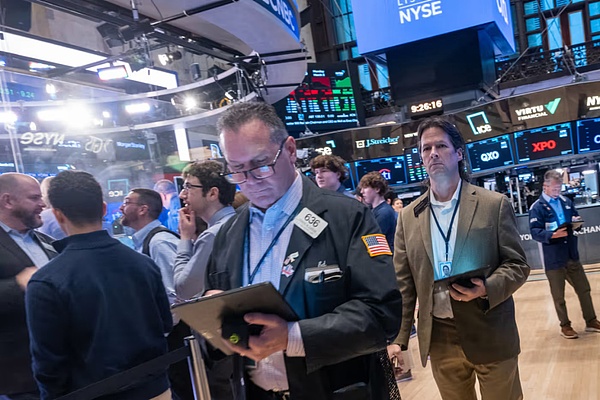Various negative factors have converged at the worst possible moment, and the complacency of investors has disappeared as they finally start to take Trump's tariff threats seriously.
Buffett recently called tariffs a "war-like act" that could further exacerbate inflation, and after digesting a lot of information in recent weeks, the US stock market seems to agree with this view, with the market falling again on Monday (March 3).
After the US presidential election, experts had put forward many reasons why there was no need to worry that Trump would do whatever he said, arguing instead that deregulation and other economic stimulus measures would be the hallmark of this Trump administration, rather than trade wars and so on. Now it appears that Trump is serious about a key part of his agenda - tariffs - and the stock market has returned to the level of early November last year, erasing the gains made after the election.
Trump said on Monday that the 25% tariffs on goods from Mexico and Canada will take effect on March 4, causing the stock market to plummet. The Dow fell 1.5%, the S&P 500 fell 1.8%, and the Nasdaq Composite plunged 2.6%.
Dave Rosenberg, founder of Rosenberg Research, wrote in a report: "I think the honeymoon between Trump and the stock market is over." He pointed out that only 8% of S&P 500 stocks are at 52-week highs, far below the 25% peak in early November last year. Rosenberg said: "The stock performance after this election is vastly different from the Trump 1.0 period....the US economy is not accelerating, it is actually slowing down."

For some with good memories, this may not be surprising, as the uncertainty around tariffs was the main reason for the S&P 500's decline during Trump's first term. Barron's warned last December that the stock market could fall after the president's inauguration. After a painful February for the S&P 500, the market seems to be taking this issue more seriously.
TS Lombard analyst Jon Harrison said: "The start of Trump 2.0's tariff diplomacy is clearly staged, including easy wins, delayed taxation, and lower tariff rates on China than previously threatened, which gave investors a sense of complacency that Trump would negotiate a deal rather than threaten massive tariffs as he did during the campaign. That complacency has now disappeared."
The White House's decision to further raise tariffs on China by 10% and impose 25% tariffs on Mexico and Canada has completely shattered investors' hopes that trade flows would not be significantly disrupted, and has made the stock market take Trump's other tariff policies, such as the threat of a 25% tariff on the EU, more seriously.
With Trump also requiring the US Foreign Investment Committee to review Chinese investments in certain areas, it also seems unlikely that mutual concessions will be easy. Harrison wrote in the report that "other announced measures may again raise concerns about previously resolved issues, including compliance with accounting standards and strengthening the enforcement of listing requirements for Chinese companies in the US. China has indicated that it will retaliate against these measures and tariffs."
Therefore, in the foreseeable future, the stock market will continue to be constrained by the tug-of-war in trade negotiations, while other data has already begun to undermine investors' confidence in the US economy.
Evercore ISI analyst Julian Emanuel said: "In addition to the negative impact of the uncertainty of 'Trade War 2.0' on the S&P 500, inflation and massive government layoffs are causing 'soft data points' like consumer confidence to flash yellow, threatening economic growth." Emanuel also pointed out that the increase in initial jobless claims last week was the first crack in the "hard data" regarding the health of the economy.
In short, various negative factors have converged at the worst possible moment.
22V Research analyst Dennis DeBusschere wrote in a report that "with US economic growth already slowing, trade policy is impacting consumer demand - assuming the tariff threat is implemented - increasing the probability of a negative feedback loop in the US economy."
However, investors don't need to completely abandon US stocks. If the tariff uncertainty persists, high volatility will continue to be the theme of the market, but although the S&P 500 may fall further in the coming months, Evercore ISI's Emanuel believes the index could still end the year with cumulative gains and reach 6,800 points. Barron's also believes the S&P 500 will ultimately rise for the full year.
DataTrek analyst Nicholas Colas believes that even with more volatility ahead, investors should take a longer-term view. He wrote in a report that "the important thing is not to forget that the 'American exceptionalism' in terms of stock price performance is a relative/long-term concept, and does not guarantee that the S&P 500 will outperform all competitors in any given quarter. Given the high expectations and policy uncertainty on multiple fronts, the current performance of US stocks is already quite good."
This may be true, but to borrow Buffett's analogy, this does not mean that US stocks will not be hit before the recovery, as war is good for no one.






